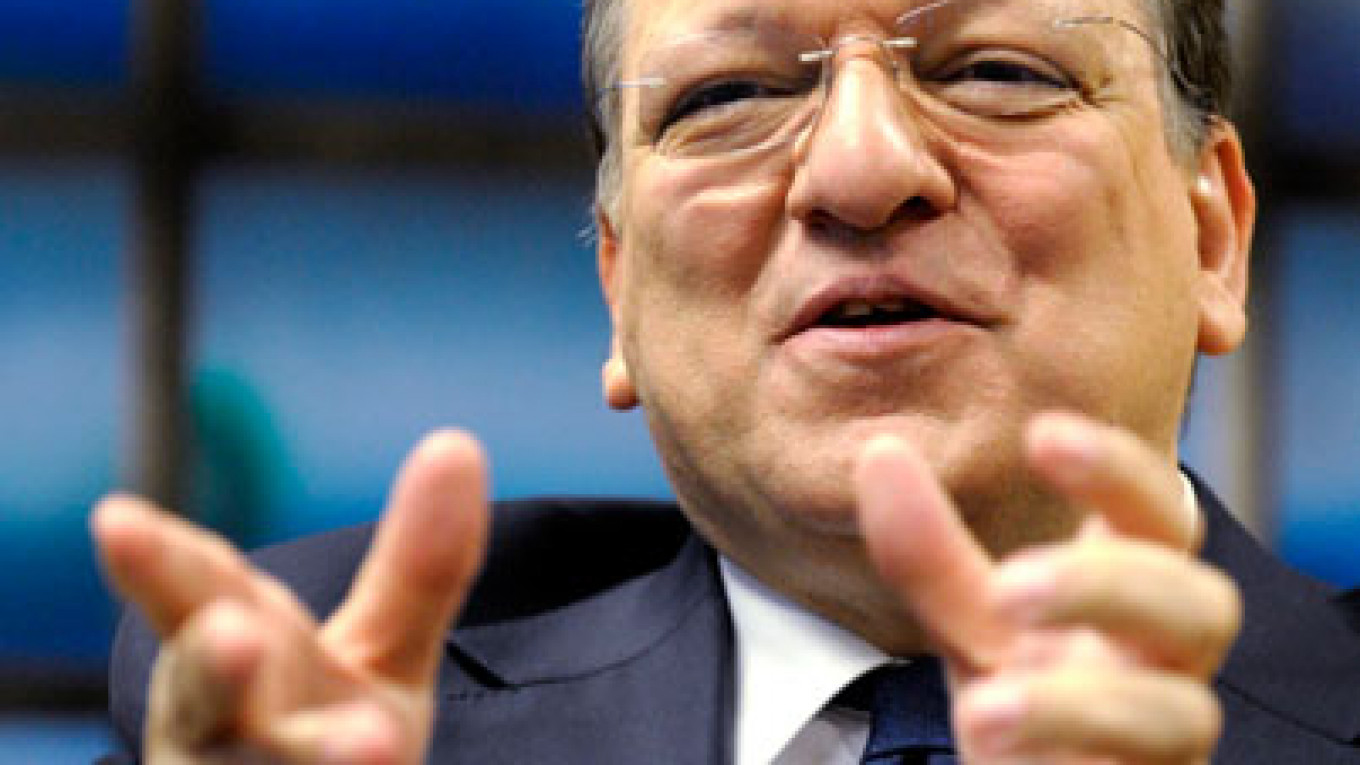BRUSSELS — Imposing sanctions on Ukraine now would be a mistake and the priority should be creating the right conditions for a peaceful political transition, European Commission President Jose Manuel Barroso said.
In secret recordings released on the Internet last week, a senior U.S. official was caught disparaging European Union policy on Ukraine and suggesting the bloc had been soft after Kiev's decision to reject an EU trade deal and accept cheap loans from Russia.
Washington is advocating a tougher line, saying sanctions should be imposed to punish President Viktor Yanukovych for the violent crackdown ordered against protesters, who have been demonstrating in favor of the EU for nearly three months.
At least six protesters have been killed.
"We are now in a phase where the priority is to stabilize the country, to avoid violence, to have the beginning of a serious conversation between the government and the opposition," Barroso said in an interview as part of a Reuters eurozone summit. "At this stage, other measures could only have a negative effect."
He said Europe needed to help "create the conditions … for a political transition that enjoys, or a solution that could enjoy full legitimacy in Ukraine."
But he added that if the situation did deteriorate and violence against protesters continued, he had personally told Yanukovych that the EU would not stand by.
"There will be consequences in the relations between Ukraine and the EU," he said.
In a phone recording uploaded on YouTube, Victoria Nuland, the U.S. assistant secretary of state for European affairs, was heard telling the U.S. ambassador to Ukraine that the U.S. should adopt an "[expletive] the EU" attitude.
In a separate recording also posted on YouTube, a senior EU official, Helga Schmid, can be heard expressing concerns to the EU ambassador in Ukraine about the EU's perceived weakness in the eyes of the U.S.
The impression created by the recordings, which Western officials suspect were made by Russia, is of deep divisions between two allies over a critical foreign policy issue.
The split plays into Russia's hands, since it is determined that Ukraine, a former Soviet satellite, should not move closer to the EU. It offered Kiev up to $15 billion in cheap loans and cuts to the price of its gas imports if it rejected the EU trade deal.
Barroso played down any competition with Washington for influence in Ukraine, and said that ultimately it was Europe that could offer the country a future, not anyone else.
"We are not competing with our American partners. On this matter, the EU has more to give to Ukraine than any other partner," he said.
The protesters, who took over Kiev's central Maidan Square in late November after the government rejected the EU deal, are frequently photographed waving the EU's blue-and-gold-stars flag.
"We are doing everything we can to help Ukraine according to our principles and I expect the U.S. to be supporting that line," Barroso said. "The Ukrainian people want to come closer to the EU. The flags Ukrainian people have been waving are EU flags."
Nuland has apologized for her undiplomatic comments and EU officials have sought to play down the spat. Barroso said ultimately it was up to the EU to play the leadership role.
"Many of my American friends have told me privately that there is no one better placed than the EU to play a positive role in developments in Ukraine," he said.
"When the conditions are right, Ukraine will come closer to the EU because it is obviously in their interests from an economic and a social point of view to come closer to a system that gives them much more benefits."
A Message from The Moscow Times:
Dear readers,
We are facing unprecedented challenges. Russia's Prosecutor General's Office has designated The Moscow Times as an "undesirable" organization, criminalizing our work and putting our staff at risk of prosecution. This follows our earlier unjust labeling as a "foreign agent."
These actions are direct attempts to silence independent journalism in Russia. The authorities claim our work "discredits the decisions of the Russian leadership." We see things differently: we strive to provide accurate, unbiased reporting on Russia.
We, the journalists of The Moscow Times, refuse to be silenced. But to continue our work, we need your help.
Your support, no matter how small, makes a world of difference. If you can, please support us monthly starting from just $2. It's quick to set up, and every contribution makes a significant impact.
By supporting The Moscow Times, you're defending open, independent journalism in the face of repression. Thank you for standing with us.
Remind me later.






